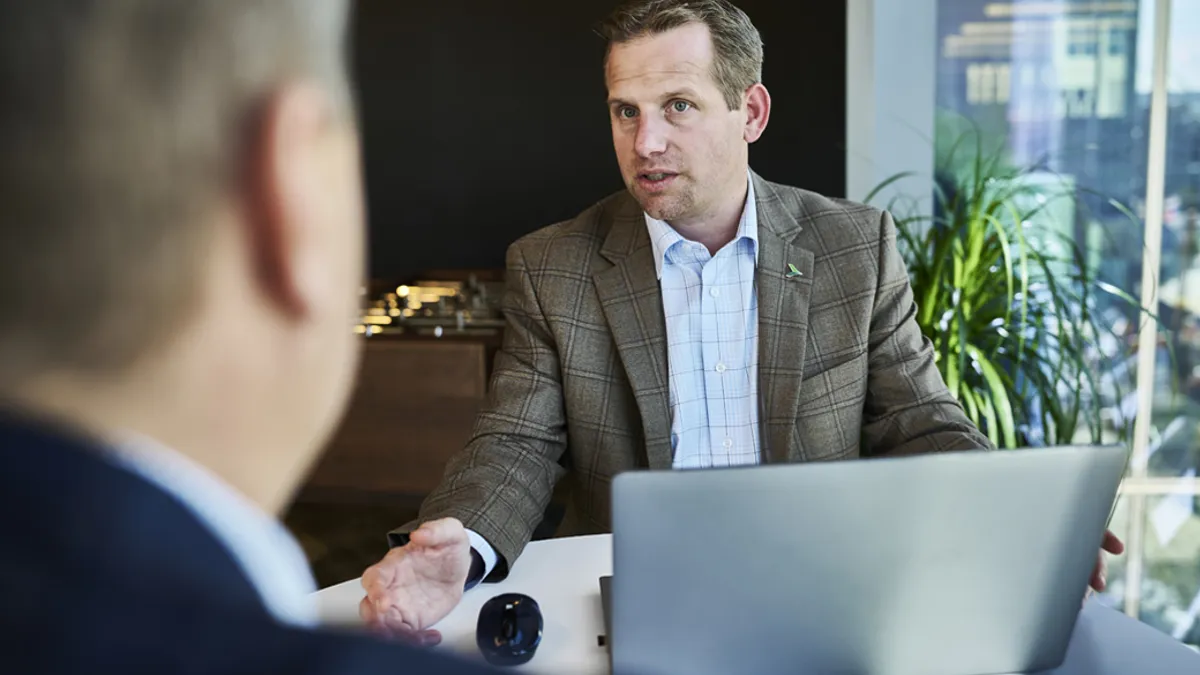Editor's Note: This article is part of a series on benefits technology. All stories in this series can be found here.
A burgeoning startup scene has enabled innovation even in "unsexy" fields — including many facets of HR.
Controversial or not, startups like Zenefits, Gusto and Flock represent the power of technology to shake up the (often rusty) status quo. The rise of "robo-advisers" is the current analogue for the retirement industry — and like many innovations, has been greeted with a mixture of curiosity and confusion.
When Tom Clark, counsel of The Wagner Law Group, polled the crowd at the 2016 Benefits Forum and Expo asking who used robo-advisers, for example, no one raised a hand.
Digitization — and the foibles that could come with it — is a big theme of #BFE16. HR Dive attended "Robos for Retirement" and spoke directly with Cynthia Loh, general manager of Betterment for Business, to figure out the basics.
What can robo advisers do?
Robo-advising is a term that is used broadly, Loh said, but overall, it is smart technology that can crunch numbers and give advice immediately via usually online platforms. At the panel discussion, multiple forms of robo services were present, ranging from completely vertically integrated financial advisement services like Betterment for Business and the more "add-on" capabilities of programs like Blooom (yes, three o's) that attach to existing retirement savings accounts.
In the past, financial advisers were typically for those in the "upper echelons" of society, Loh said. Those with money to spend were usually the only ones who could pay for such services. Now, agile technology — the basis for robo-advising — enables access to advising for people from all walks of life.
Andrew Wank, director of business development at Blooom, said that above all, the new technology allows for "a more human experience" when it comes to managing a 401(k). Robo-advising gets right down to the participant level, and can speak directly to employees to ensure they better understand their retirement plan.
Turns out this modernized technology has made strong impressions in the industry, according to the panel. Plan sponsors "sincerely" want to ensure their employees are on track to retirement, Loh said, and that's where Betterment is seeing the most success. They've recorded around 300% growth year over year, she added.
Wank agreed, noting that more plan sponsors are recognizing "their limitations and the limitations of humans in a 24/7 society." More than ever, participants are asking for help. In a rising number of cases, robo-advising can provide it.
What about the fiduciary rule and compliance?
The Department of Labor's fiduciary rule, set to go into effect in April, makes it so advisers must act in the interest of the client above all. It has a number of opponents. Betterment for Business is not one of them.
"We're actually excited about this," Loh said. Betterment was approached by the DOL to discuss the impact of robo-advisers in the space and their impact on the rule, she added. While the definition of "robo-adviser" could be broadened to include advances from decades before, they've only garnered attention within the last decade or so. Betterment, for example, is only 6 years old. Blooom is only 3.
Robo advisers, due to their digital nature, tend to be able to provide a more independent review of which funds to invest in. Human advisers are often employed by one fund manager or another, which naturally can lead to certain conflicts of interest. Both Loh and Wank noted the transparency that robo-advisers can bring to financial operations. Robos can reveal fees and make calculations based on what a participant needs.
"Robots get a bad rap, but they don't lie," Wank said.
Why now? And what’s next?
Like with many well-established industries, the retirement industry was "ripe" for a startup shakeup, Loh said. The DOL rule may have pushed along a call for new solutions, but part of the rise may be due to incumbents "sitting on their laurels," as Loh noted. That means innovation can sprout — especially when companies like Blooom and Betterment are based entirely on modern systems and don't have to worry about adapting old legacy systems. Being nimble is key.
But that also means more change is yet to come. When asked at the panel how he thought the industry would look in 5 or 10 more years, Wank said he hoped that there will be "a lot more of us" robo-advisers. Employers and plan sponsors are going to have to be careful and fully vet their options — and they should start doing so now.
"Tech savvy does not always equal financially literate," Wank said. Often, C-level folks struggle with the same problems as those lower down the totem pole, especially if they feel their reputation would be at risk if they revealed their issues at the typical company educational meeting.
Times are changing. "The technology's reach has helped break that barrier," Wank said.





















